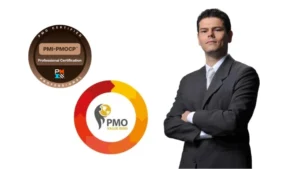The PMI PfMP (Portfolio Management Professional) certification is a professional designation offered by the Project Management Institute (PMI) for individuals who manage and lead portfolios of projects within an organization. This certification recognizes the knowledge and skills required to align portfolio goals with organizational strategy and manage the balance of resources, risks, and benefits to achieve desired outcomes. In this post we will learn “Everything You Should Know About PMI PfMP” in detail.
Effective portfolio management becomes increasingly important as organizations continue to grow and evolve. Portfolio management helps organizations prioritize and align their initiatives and projects to achieve their overall goals and objectives. It is a strategic approach that allows organizations to optimize resources and minimize risks while maximizing the benefits of their projects and programs.
For professionals looking to advance their careers in portfolio management, the PMI PfMP certification can be a valuable asset. It demonstrates a high level of expertise in the field and the ability to lead and manage portfolios effectively. This blog post will provide an overview of everything you should know about the PMI PfMP certification, including eligibility requirements, the exam and certification process, continuing education and renewal, and career opportunities and benefits.
Everything You Should Know About PMI PfMP Eligibility and Exam Requirements
To qualify for the PMI PfMP certification, candidates must meet specific education and experience requirements. These requirements are as follows:
- Secondary degree (high school diploma, associate’s degree, or the global equivalent)
- All applicants must possess a minimum of 96 months of professional business experience within the last 15 years AND
- 84 months of portfolio management experience
OR
- Four-year degree (bachelor’s degree or the global equivalent)
- All applicants must possess a minimum of 96 months of professional business experience within the last 15 years AND
- 48 months of portfolio management experience
Once the candidate has met the eligibility requirements, they can apply for the PMI PfMP certification by filling out an application on the PMI website and submitting the required documentation. The application is reviewed for completeness and accuracy, and PMI will notify the candidate of their eligibility status within four to six weeks.
It’s important to note that PMI reserves the right to verify any information provided in the application and may require additional documentation. Additionally, PMI may audit a random selection of applications to ensure they are complete and accurate.
Once the application has been approved, the candidate can schedule and take the PfMP exam.
Everything You Should Know About PMI PfMP Certification Process
The PMI PfMP certification exam is a computer-based test that consists of 170 multiple-choice questions. The exam is designed to test the candidate’s knowledge and understanding of the following topics:
- Portfolio Governance
- Portfolio Performance Measurement
- Portfolio Alignment
- Portfolio Prioritization
- Portfolio Implementation
- Portfolio Evaluation and Adaptation
The exam is four hours long and is offered in multiple languages at testing centers worldwide. Candidates must score at least 170 out of 200 to pass the exam. The exam results are usually available within two to four weeks after the exam date.
Once the candidate has passed the exam, they will be awarded the PMI PfMP certification. The certification is valid for five years and can be renewed through the completion of professional development units (PDUs) and a re-examination every five years.
How to prepare for the PfMP exam
Preparing for the PMI PfMP (Portfolio Management Professional) exam can be challenging, but with the right approach, you can increase your chances of success. Here are some tips to help you prepare for the PfMP exam:
- Understand the Exam Content Outline: The Exam Content Outline (ECO) is a document that provides an overview of the topics and subtopics covered on the exam. Reviewing the ECO can help you identify where you need to focus your study efforts.
- Take a PMI-approved PfMP course: Taking a PMI-approved PfMP course can provide a comprehensive understanding of the exam content and help you prepare for the exam. These courses are usually taught by experienced professionals and can provide you with valuable insights and tips for the exam.
- Study the PMBOK Guide, Portfolio Management Standards, and The Standard for Portfolio Management: These PMI publications provide a detailed overview of the concepts and best practices covered on the exam. Reviewing these materials can help you understand the exam content better and can also help you during your professional work.
- Practice sample questions and take mock exams: Practicing sample questions and taking mock exams can help you become familiar with the format of the exam and can also help you identify areas where you need to improve.
- Consider working with a study group or a tutor: Working with a group or a tutor can provide you with additional support and resources as you prepare for the exam.
- Get enough rest and avoid stress: Get enough rest and avoid stress, as it can affect your ability to focus and retain information.
- Be familiar with the format of the exam and the testing center rules.
Remember, the key to success is consistency, discipline, and perseverance. Follow a study plan, stick to it, and don’t give up.
Continuing Education and Renewal
To maintain the certification, candidates must complete 60 professional development units (PDUs) in portfolio management every three years.
Professional Development Units(PDUs) are a way for certified individuals to maintain and improve their skills and knowledge. These units can be earned through various activities such as attending conferences, workshops, seminars, and online courses. PDUs must be directly related to portfolio management, and at least 35 of the 60 required PDUs must be earned through formal education.
Gururo provides PMI PfMP PDUs at a very nominal cost. Do check out the details here
Can I do PfMP without PMP?
Yes, you can pursue the PMI PfMP (Portfolio Management Professional) certification without holding the PMI PMP (Project Management Professional) certification.
PMI PfMP vs. PMI PgMP vs. PMI PMP
The PMI PfMP (Portfolio Management Professional), PMI PgMP (Program Management Professional), and PMI PMP (Project Management Professional) are all professional certifications offered by the Project Management Institute (PMI). Still, they focus on different areas of project management. Here are the key differences between the three certifications:
- PMI PfMP: Focuses on portfolio management, which is the strategic management of multiple projects, programs, and initiatives to align them with organizational goals and objectives. The PfMP certification recognizes the knowledge and skills required to lead and manage portfolios effectively and efficiently.
- PMI PgMP: Focuses on program management, which is managing a group of related projects that are coordinated to achieve a specific strategic outcome. The PgMP certification recognizes the knowledge and skills required to lead and manage programs effectively and efficiently.
- PMI PMP: Focuses on project management, which is the application of knowledge, skills, tools, and techniques to plan, execute, monitor, and close projects successfully. The PMP certification recognizes the expertise and skills required to lead and manage individual projects effectively and efficiently.
Regarding eligibility requirements, the PfMP and PgMP certifications require more experience than the PMP certification. For example, PfMP requires 8,000 hours of portfolio management experience, PgMP requires 8,000 hours of program management experience, and PMP requires 4,500 hours of project management experience.
In terms of exam content, the PfMP exam covers topics such as Portfolio Governance, Portfolio Performance Measurement, Portfolio Alignment, Portfolio Prioritization, Portfolio Implementation, and Portfolio Evaluation and Adaptation. The PgMP exam covers topics such as Program Life Cycle, Strategic Alignment, Governance, Benefits Management, Stakeholder Management, and Risk Management. The PMP exam covers topics related to Project Management.
PfMP handbook guide
A PMI PfMP (Portfolio Management Professional) guide is a resource that can provide you with an overview of the certification process and help you prepare for the exam. It can include the following information:
- Eligibility requirements: An overview of the education and experience requirements to become PfMP certified.
- Exam content: A description of the topics and subtopics covered on the exam, the format of the exam and the number of questions.
- Study materials: A list of recommended study materials, such as the PMBOK Guide, Portfolio Management Standards, and The Standard for Portfolio Management.
- Tips and strategies: Suggestions for preparing for the exam, such as taking a PMI-approved PfMP course, practicing sample questions, and working with a study group or a tutor.
- Continuing education and renewal: Information on the PDU requirements and the process for renewing the certification.
- Career opportunities: An overview of the job roles and responsibilities of PfMP certified professionals and the impact of the certification on career growth and earning potential.
- A guidebook may also include sample questions, practice tests, and other resources to help you study for the exam.
Salary after PfMP
According to PMI’s Earning Power: Project Management Salary Survey, 9th Edition, professionals with the PfMP certification earn an average salary of $126,000 annually. This is higher than the average salary of $112,000 yearly for non-certified portfolio managers.
However, it’s important to note that the salary can also vary based on other factors such as location, industry, and experience level. For example, in the United States, the salary for PfMP-certified professionals can range from $100,000 to $150,000 or more, depending on the location and industry.
How many PfMP are there?
There are 1346 PfMP holders as of Jan 2023.
Is PfMP certification worth it?
Whether the PMI PfMP (Portfolio Management Professional) certification is worth depends on an individual’s career goals and aspirations.
Here are some potential benefits of the PfMP certification:
- Demonstrates a high level of expertise in portfolio management: The PfMP certification recognizes the knowledge and skills required to lead and manage portfolios effectively and efficiently. It proves to employers, colleagues, and clients that the certification holder has a deep understanding of the field and the ability to apply it in practice.
- Can open up new career opportunities: The PfMP certification can increase the holder’s visibility in the job market and open up new career opportunities, particularly in leadership roles in portfolio management.
- Enhance earning potential: The PfMP certification can increase earning potential, as certified professionals are often sought after and may command higher salaries than their non-certified counterparts.
- Helps to stay current with the latest trends and best practices: The PfMP certification requires continuing education and renewal, which allows professionals to stay current with the latest trends and best practices in the field.
Conclusion : Everything You Should Know About PMI PfMP
In conclusion, the PMI PfMP (Portfolio Management Professional) certification is a valuable asset for professionals looking to advance their careers in portfolio management. It demonstrates a high level of expertise in the field and the ability to lead and manage portfolios effectively.
Holding the PMI PfMP certification can open up new career opportunities and may lead to increased earning potential. In addition, it demonstrates a commitment to the profession and a dedication to staying current with the latest trends and best practices in portfolio management.
Overall, the PMI PfMP certification is a worthwhile investment for professionals looking to advance their careers in portfolio management and stay current with the latest trends and best practices.

















